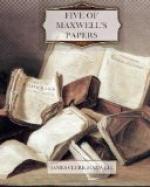One of the most profound mathematicians and thinkers of our time, the late George Boole, when reflecting on the precise and almost mathematical character of the laws of right thinking as compared with the exceedingly perplexing though perhaps equally determinate laws of actual and fallible thinking, was led to another of those points of view from which Science seems to look out into a region beyond her own domain.
“We must admit,” he says, “that there exist laws” (of thought) “which even the rigour of their mathematical forms does not preserve from violation. We must ascribe to them an authority, the essence of which does not consist in power, a supremacy which the analogy of the inviolable order of the natural world in no way assists us to comprehend.”
***
Introductory Lecture on Experimental Physics.
James Clerk Maxwell
The University of Cambridge, in accordance with that law of its evolution, by which, while maintaining the strictest continuity between the successive phases of its history, it adapts itself with more or less promptness to the requirements of the times, has lately instituted a course of Experimental Physics. This course of study, while it requires us to maintain in action all those powers of attention and analysis which have been so long cultivated in the University, calls on us to exercise our senses in observation, and our hands in manipulation. The familiar apparatus of pen, ink, and paper will no longer be sufficient for us, and we shall require more room than that afforded by a seat at a desk, and a wider area than that of the black board. We owe it to the munificence of our Chancellor, that, whatever be the character in other respects of the experiments which we hope hereafter to conduct, the material facilities for their full development will be upon a scale which has not hitherto been surpassed.
The main feature, therefore, of Experimental Physics at Cambridge is the Devonshire Physical Laboratory, and I think it desirable that on the present occasion, before we enter on the details of any special study, we should consider by what means we, the University of Cambridge, may, as a living body, appropriate and vitalise this new organ, the outward shell of which we expect soon to rise before us. The course of study at this University has always included Natural Philosophy, as well as Pure Mathematics. To diffuse a sound knowledge of Physics, and to imbue the minds of our students with correct dynamical principles, have been long regarded as among our highest functions, and very few of us can now place ourselves in the mental condition in which even such philosophers as the great Descartes were involved in the days before Newton had announced the true laws of the motion of bodies. Indeed the cultivation and diffusion of sound dynamical ideas has already effected a great change in the language and thoughts even of those who make no pretensions




